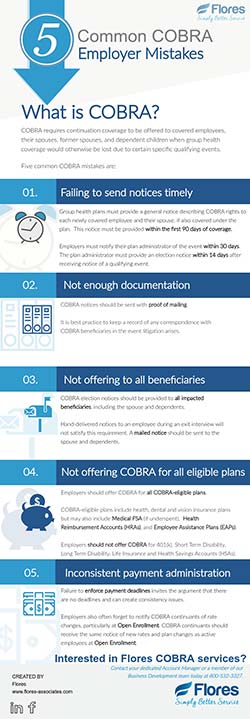Common COBRA Mistakes Employers Make
COBRA requires continuation coverage to be offered to covered employees, their spouses, former spouses, and dependent children when group health coverage would otherwise be lost due to certain specific events.
Charlotte, NC – April 12, 2018 – COBRA covers group health plans sponsored by an employer (private-sector or state/local government) that employed at least 20 employees on more than 50 percent of its typical business days in the previous calendar year. COBRA mistakes are common and can be costly. Here are five COBRA mistakes employers make:
- Failing to send notices timely
- Not enough documentation
- Not offering to all beneficiaries
- Not offering COBRA for all eligible plans
- Inconsistent payment administration
Group health plans must give each employee and each spouse of an employee who becomes covered under the plan a general notice describing COBRA rights. The general notice must be provided within the first 90 days of coverage. After receiving a notice of a qualifying event, the plan must provide the qualified beneficiaries with an election notice. Employers have 30 days to notify their plan administrator of the qualifying event. The election notice must be sent within 14 days after the plan administrator receives notice of a qualifying event. Late notices can result in a $110 per day penalty and extends the COBRA election period.
COBRA notices should be sent with proof of mailing. It is best practice to keep a record of any correspondence with COBRA beneficiaries in the event litigation arises.
COBRA election notices should be provided to all impacted beneficiaries, including spouses and dependents. Hand-delivered notices to an employee during an exit interview will not satisfy this requirement. A mailed notice should be sent to the spouse and dependents.
Employers should offer COBRA for all COBRA-eligible plans. COBRA-eligible plans include health, dental and vision insurance plans but may also include Medical FSA (if underspent), Health Reimbursement Accounts (HRAs), and Employee Assistance Plans (EAPs).
Employers should not offer COBRA for 401(k), Short Term Disability, Long Term Disability, Life Insurance and Health Savings Accounts (HSAs).
Failure to enforce payment deadlines invites the argument that there are no deadlines and can create consistency issues. Employers also often forget to notify COBRA continuants of rate changes, particularly at Open Enrollment. COBRA continuants should receive the same notice of new rates and plan changes as active employees at Open Enrollment.
Consequences of non-compliance can be steep. Employer mistakes increase your risk of litigation. Failure to offer COBRA can lead to excise taxes, a $110 per day ERISA penalty. Inconsistent administration and documentation makes defending yourself if litigation arises harder and more costly.
About Flores
Flores is a leading national administrator of tax advantaged consumer based reimbursement plans such as Medical and Dependent Care Flexible Spending Accounts (FSAs), Health Reimbursement Arrangements (HRAs), Health Savings Accounts (HSAs) and Qualified Transportation Expense Accounts (QTEs). Additionally, Flores handles COBRA administration and billing services for employers. Based in Charlotte, NC, Flores has emerged as the leader in this field through a service model founded upon innovative technology, dedicated professionals, and an uncompromising commitment to superior service.
Contact
To learn more about the services offered by Flores, existing clients may contact their dedicated Account Manager.
Brokers, potential clients, and media representatives may contact:
- Cindy Bistany
- Director of Business Development and Strategic Alliances
- 828-693-3595
- cindy@flores-associates.com
- Clay Peddycord, GBA, CFC
- Director of Business Development and Strategic Alliances
- 800-532-3327
- clay.peddycord@flores-associates.com
- Aaron Hunt, MBA, CDHC, HSAe, Certified COBRA Administrator
- Director of Business Development and Strategic Alliances
- 800-532-3327
- aaron.hunt@flores-associates.com













